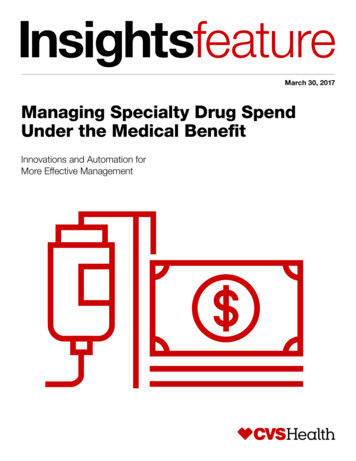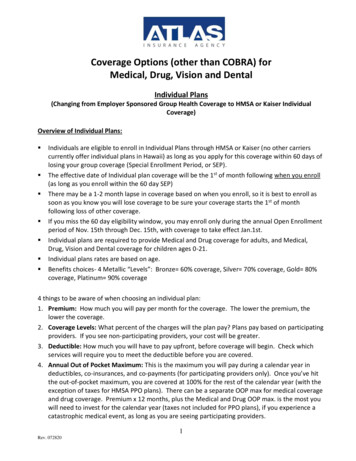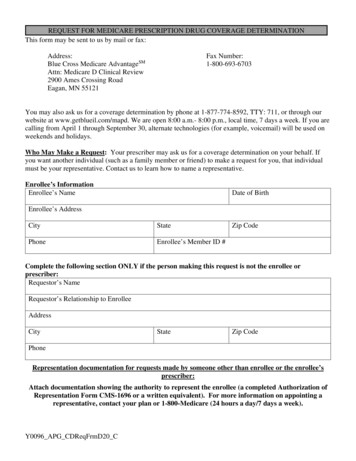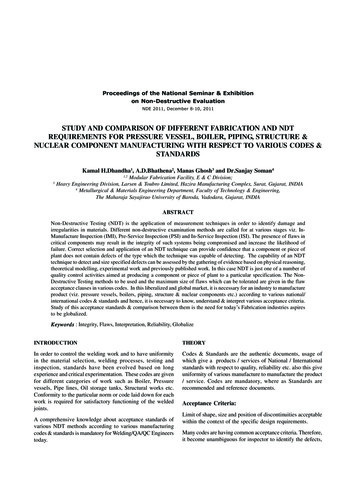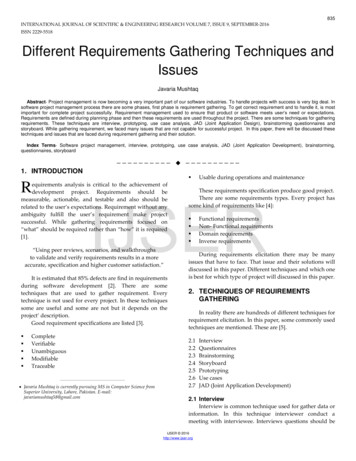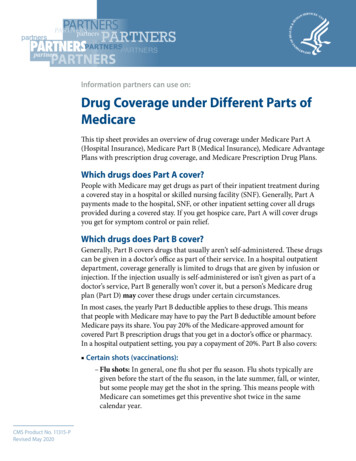
Transcription
rtnersPARTNERSPARTNERSpartnersInformation partners can use on:Drug Coverage under Different Parts ofMedicareThis tip sheet provides an overview of drug coverage under Medicare Part A(Hospital Insurance), Medicare Part B (Medical Insurance), Medicare AdvantagePlans with prescription drug coverage, and Medicare Prescription Drug Plans.Which drugs does Part A cover?People with Medicare may get drugs as part of their inpatient treatment duringa covered stay in a hospital or skilled nursing facility (SNF). Generally, Part Apayments made to the hospital, SNF, or other inpatient setting cover all drugsprovided during a covered stay. If you get hospice care, Part A will cover drugsyou get for symptom control or pain relief.Which drugs does Part B cover?Generally, Part B covers drugs that usually aren’t self-administered. These drugscan be given in a doctor’s office as part of their service. In a hospital outpatientdepartment, coverage generally is limited to drugs that are given by infusion orinjection. If the injection usually is self-administered or isn’t given as part of adoctor’s service, Part B generally won’t cover it, but a person’s Medicare drugplan (Part D) may cover these drugs under certain circumstances.In most cases, the yearly Part B deductible applies to these drugs. This meansthat people with Medicare may have to pay the Part B deductible amount beforeMedicare pays its share. You pay 20% of the Medicare-approved amount forcovered Part B prescription drugs that you get in a doctor’s office or pharmacy.In a hospital outpatient setting, you pay a copayment of 20%. Part B also covers: Certain shots (vaccinations):––Flu shots: In general, one flu shot per flu season. Flu shots typically aregiven before the start of the flu season, in the late summer, fall, or winter,but some people may get the shot in the spring. This means people withMedicare can sometimes get this preventive shot twice in the samecalendar year.CMS Product No. 11315-PRevised May 2020
Which drugs does Part B cover? (continued) Certain shots (vaccinations): (continued)––Pneumococcal shots: Two shots to help prevent pneumococcal infections (likecertain types of pneumonia). The two shots protect against different strains ofthe bacteria. Part B covers the first shot at any time, and also covers a differentsecond shot if it’s given one year (or later) after the first shot. People withMedicare should talk with their doctor or other health care provider to see if theyneed one or both of the pneumococcal shots.––Hepatitis B shots: A series of shots covered only for people at high or mediumrisk for Hepatitis B. A person’s risk for Hepatitis B increases if the person hashemophilia, End-Stage Renal Disease (ESRD)—permanent kidney failurerequiring dialysis or a kidney transplant—or certain conditions that increasethe person’s risk for infection. Other factors may also increase a person’s risk forHepatitis B. To determine if they’re eligible for coverage, people with Medicareshould check with their doctor to see if they’re at high or medium risk forHepatitis B.––Other shots: Some other vaccines when they’re directly related to the treatmentof an injury or illness (like a tetanus shot after stepping on a nail). Durable Medical Equipment (DME) supply drugs: Medicare covers drugsadministered through a covered item of DME, like an infusion pump or a nebulizer. Injectable and infused drugs: Medicare covers most injectable and infused drugsgiven by a licensed medical provider if the drug is considered reasonable andnecessary for treatment and usually isn’t self-administered. Injectable osteoporosis drugs: Medicare covers an injectible drug for women withosteoporosis who meet the coverage criteria for the Medicare home health benefitand have a bone fracture that a doctor certifies was related to post-menopausalosteoporosis. A doctor must certify that the woman is unable to learn to give herselfthe drug by injection. The home health nurse or aide won’t be covered to provide theinjection unless family and/or caregivers are unable or unwilling to give the drug byinjection. Some antigens: Medicare helps pay for antigens if they’re prepared by a doctor andgiven by a properly instructed person (who could be the patient) under appropriatesupervision.2 Erythropoiesis stimulating agents: Medicare will help pay for erythropoietin byinjection if a person with Medicare has ESRD and needs this drug to treat anemia.Medicare may also cover these drugs to treat anemia for people who don’t haveESRD.
Which drugs does Part B cover? (continued) Blood clotting factors: If a person with Medicare has hemophilia, Medicare helpspay for clotting factors they give themselves by injection. Immunosuppressive drugs: Medicare covers immunosuppressive drug therapy forpeople who received an organ transplant for which Medicare made payments.––If a person is entitled to Medicare only because of permanent kidney failure,their Medicare coverage will end 36 months after the month of the transplant.Medicare won’t pay for any services or items, including immunosuppressivedrugs, for patients who aren’t entitled to Medicare.––A person with ESRD and Original Medicare may join a Medicare drug plan(Part D). Part D may cover other immunosuppressive drugs not covered byPart B, even if Medicare didn’t pay for the transplant. Oral cancer drugs: Medicare helps pay for some cancer drugs you take by mouth ifthe same drug is available in injectable form or is a prodrug of the injectable drug.A prodrug is an oral form of a drug that when ingested breaks down into the sameactive ingredient found in the injectable form of the drug. Oral anti-nausea drugs: Medicare helps pay for oral anti-nausea drugs used aspart of an anti-cancer chemotherapeutic regimen. The drugs must be administeredimmediately before, at, or within 48 hours after chemotherapy, and must be used asa full therapeutic replacement for an intravenous anti-nausea drug. Parenteral and enteral nutrition (intravenous and tube feeding): Medicarehelps pay for certain nutrients for people who can’t absorb nutrition through theirintestinal tracts or can’t take food by mouth. Intravenous Immune Globulin (IVIG) provided in the home: Medicare helps payfor IVIG for people with a diagnosis of primary immune deficiency disease.A doctor must decide that it’s medically appropriate for the IVIG to be given in thepatient’s home. Part B covers the IVIG itself, but doesn’t pay for other items andservices related to the patient getting the IVIG in his or her home. Insulin used with insulin pumps: Insulin pumps worn outside the body (external),including the insulin used with the pump, may be covered for some people withMedicare Part B who have diabetes and who meet certain conditions. Certaininsulin pumps are considered durable medical equipment. If you need to use aninsulin pump, your doctor will prescribe it for you.3
Does Part B cover self-administered drugs given in an outpatientsetting, like an emergency department or hospital observation unit?Generally, no. A person’s Medicare drug plan (Part D) may cover these drugs undercertain circumstances. A person might need to pay out-of-pocket for these drugs andsubmit a claim to their Part D plan to get paid back. He or she should call the plan formore information.You can also view the fact sheet “How Medicare Covers Self-Administered Drugs Givenin Hospital Outpatient Settings” by visiting Medicare.gov/publications.Which drugs do Medicare Advantage Plans cover?Medicare Advantage Plans must cover the drugs that are covered under Part Aand Part B. A person in a Medicare Advantage Plan will usually get their Medicareprescription drug coverage from their plan. They should contact their plan to see if itoffers prescription drug coverage. In most Medicare Advantage Plans, if a person wantsMedicare prescription drug coverage and their plan offers it, they must get it from theirMedicare Advantage Plan. A person can’t be enrolled in both a Medicare Advantage Planand a Medicare Prescription Drug Plan.Which drugs do Medicare Prescription Drug Plans cover underPart D?A Medicare Prescription Drug Plan offers comprehensive prescription drug coverage topeople with Original Medicare (Part A and Part B). In general, aPart D-covered drug must meet all of these conditions: Available only by prescription Approved by the Food and Drug Administration (FDA) Used and sold in the U.S. Used for a medically accepted indication, as defined under theSocial Security Act Not covered under Part A or Part B Included on the plan’s Part D drug list or coverage approved through the exceptions orappeals processDo Medicare drug plans cover shots (vaccinations) under Part D?Yes. All Medicare drug plans must include on their drug formularies all commerciallyavailable vaccines, like the shingles shot. Part D doesn’t cover vaccines covered underPart B, like the flu or pneumococcal shot (see pages 1–2). The plan member or providercan contact the Medicare drug plan for more information about coverage.4
Are there certain drugs that Medicare drug plans don’t coverunder Part D?Yes. By law, Part D can’t pay for drugs when they would be covered under Part A orPart B. In addition, these drugs can’t be included in basic Part D coverage: Drugs when used for weight loss or gain Drugs when used for treatment of sexual or erectile dysfunction, unless these drugsare used to treat a condition other than sexual or erectile dysfunction, for which thedrugs have been approved by the FDA Drugs when used for symptomatic relief of cough and colds Non-prescription drugs Drugs when used for cosmetic purposes or hair growth Drugs when used to promote fertility Prescription vitamins and minerals, except prenatal vitamins and fluoridepreparation productsSome Medicare drug plans may choose to cover these drugs as part of the plan’ssupplemental benefits. However, any amount spent for these drugs isn’t counted towardthe person’s out-of-pocket limit.Can people appeal a drug coverage decision?Yes. People with Medicare have certain guaranteed rights. One of these is the right to afair process to appeal decisions about coverage or payment of health care services. Howpeople file an appeal will depend on which part of Medicare is involved. People withMedicare should review their coverage decision notices carefully for instructions onhow to file an appeal.Where can people get more information or help? Visit Medicare.gov.––Look for more information on appeals at Medicare.gov/appeals.––Look for more information on Medicare drug coverage in the “Drug Coverage(Part D)” section. Select “Find health & drug plans.” Call 1-800-MEDICARE (1-800-633-4227). TTY users can call 1-877-486-2048. Contact a State Health Insurance Assistance Program (SHIP) to get freepersonalized health insurance counseling. To get the phone number for a particularstate, visit shiptacenter.org, or call 1-800-MEDICARE.5
You have the right to get Medicare information in an accessible format, likelarge print, Braille, or audio. You also have the right to file a complaint if you feelyou’ve been discriminated against. Visit on-notice, or call 1-800-MEDICARE (1-800-633-4227) for moreinformation. TTY users can call 1-877-486-2048.Paid for by the Department of Health & Human Services.
3. Which drugs does Part B cover? (continued) Blood clotting factors: If a person with Medicare has hemophilia, Medicare helps pa
